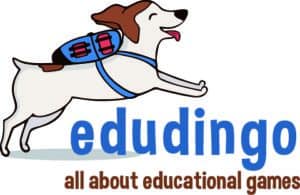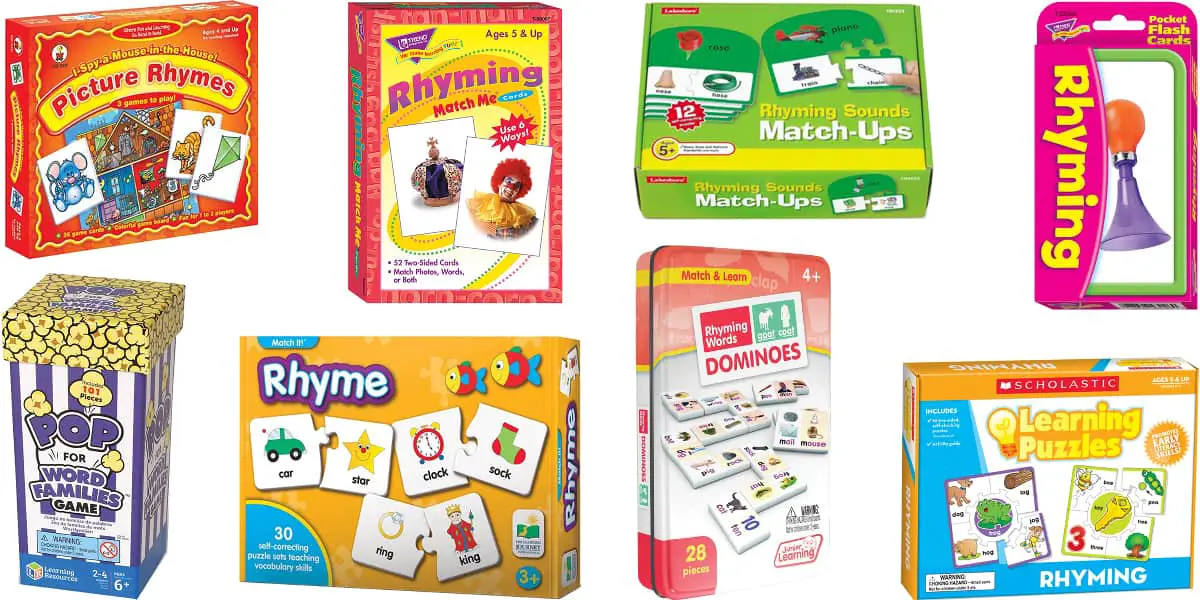This post contains affiliate links.
Rhyme games are important tools for enhancing phonemic awareness (the ability to listen, analyze and manipulate small units of sounds), itself an important step to reading & speaking correctly. This is why I wanted to investigate for you the existing card, puzzle and dominoes games out there.
What are the available rhyme card, puzzle and dominoes games? There are 13 card, puzzle, and dominoes rhyme games available, ready to enhance your kid’s vocabulary and reading skills:
- Rhyme card games enable the most flexible play (more rules are possible)
- Rhyme puzzles are Self-correcting which is great for learning
- Rhyming dominoes which are great for children who enjoy their manipulation
Rhyme Games Comparison Table
I gathered information about rhyme games on the following table to make the choosing process easy for you. The columns contain the following information:
| Game | Age | Players | Price | For | Rating |
|---|---|---|---|---|---|
| Rhyming Pocket Flash Cards | 3‑7 | 2‑4 | $ | F, T, Th | ★★★★★ |
| Rhyming Match Me Cards | 3-7 | 2‑4 | $ | F, T, Th | ★★★★☆ |
| Photo Rhymes | 3-5 | 2-4 | $$ | F, T | ★★★☆☆ |
| Pop for Word Families Game | 5‑10 | 2‑4 | $ | F, T | ★★★★★ |
| Picture Rhymes | 3-5 | 2‑4 | $$ | F | ★★★★☆ |
| Rhyming Rings | 5‑7 | 2‑4 | $ | F, T | ★★★☆☆ |
| Match It! – Rhyme | 3-7 | 1-2 | $$ | F | ★★★★★ |
| Rhyming sounds match-ups | 3-7 | 1-2 | $$ | F | ★★★☆☆ |
| Learning Puzzles: Rhyming | 3‑7 | 1‑2 | $$ | F | ★★★★☆ |
| Reading Skills Puzzles: Rhyming Words | 3‑7 | 1-2 | $$ | F, T | ★★★☆☆ |
| Rhyming Words | 6‑7 | 1‑2 | $ | F, T, Th | ★★★★★ |
| Rhyming Words Dominoes | 4-7 | 2‑4 | $$ | F | ★★★★★ |
| Rhyme Dominoes | 7-8 | 2‑4 | $$$ | F | ★★★☆☆ |
Where:
For: F (Families) / T (Teachers) / C (Counselors) / Th (Therapists)
Rhyme Card Games
Rhyme cards are made for older preschoolers as they are much more dynamic and fun than the other two categories. Gather your kid’s friends and give them that pack of cards; you will be amazed at the smiles on their faces and the fun time they are going to have.
Most of the rhyming cards are not self-corrective.
Rhyming Pocket Flash Cards (Trend enterprises)
★★★★★
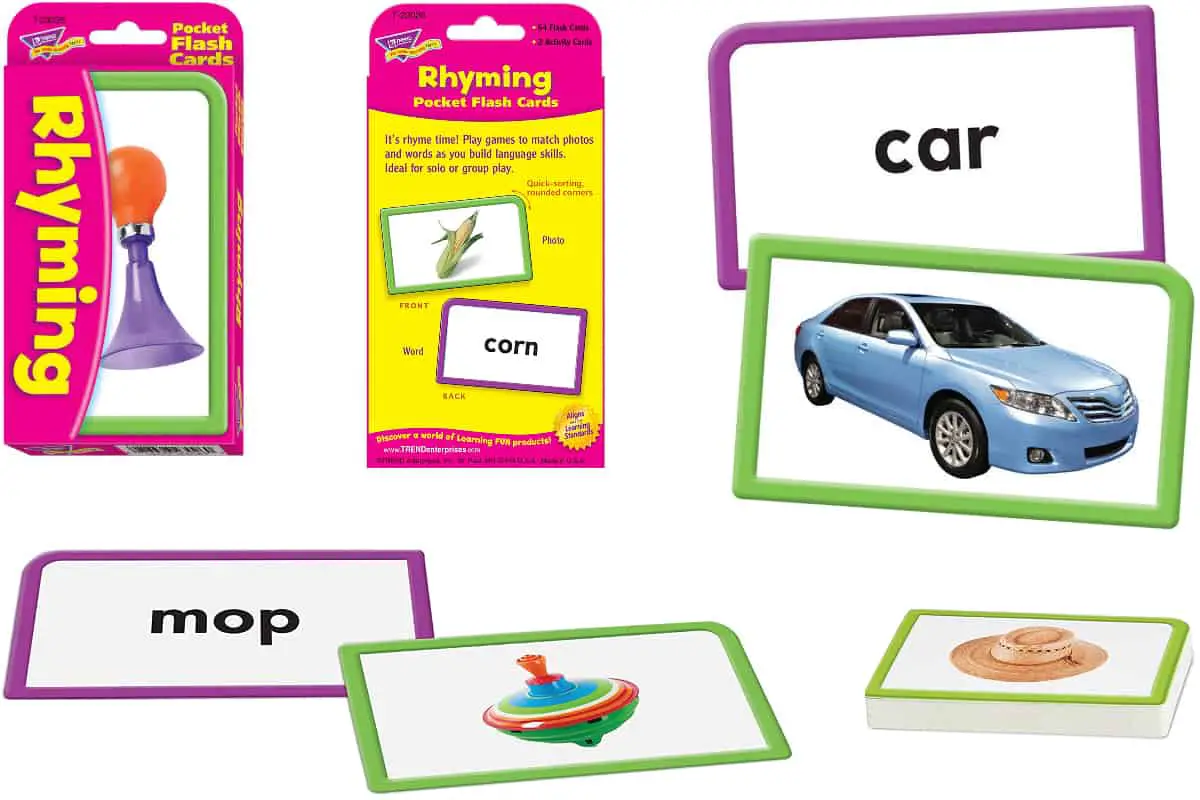
2-6 players | Age 3-7 | For families, teachers or therapists
Rhyming Pocket Flash Cards are very nice for teachers to bring to class for a fun session, a mother of two or more kids or even a mother of one.
are very nice for teachers to bring to class for a fun session, a mother of two or more kids or even a mother of one.
Each card has a word printed on a side and its picture on the other sides. There are 56 cards; each card has another one which rhymes with it.
I highly recommend this game because:
- Having images and words separated (one side and the other) enables to play in three different ways:
- With younger children (with the images) the aim is to identify the last sound of the word correctly (using it as a phonetics game)
- With older children (with the words) it becomes a reading game
- It can also be used as an inspiration for children to create songs or poems, becoming a game of self-expression and creativity
- Overall good quality of the pictures & cards for a decent price
Rhyming Match Me Cards (Trend enterprises)
★★★★☆
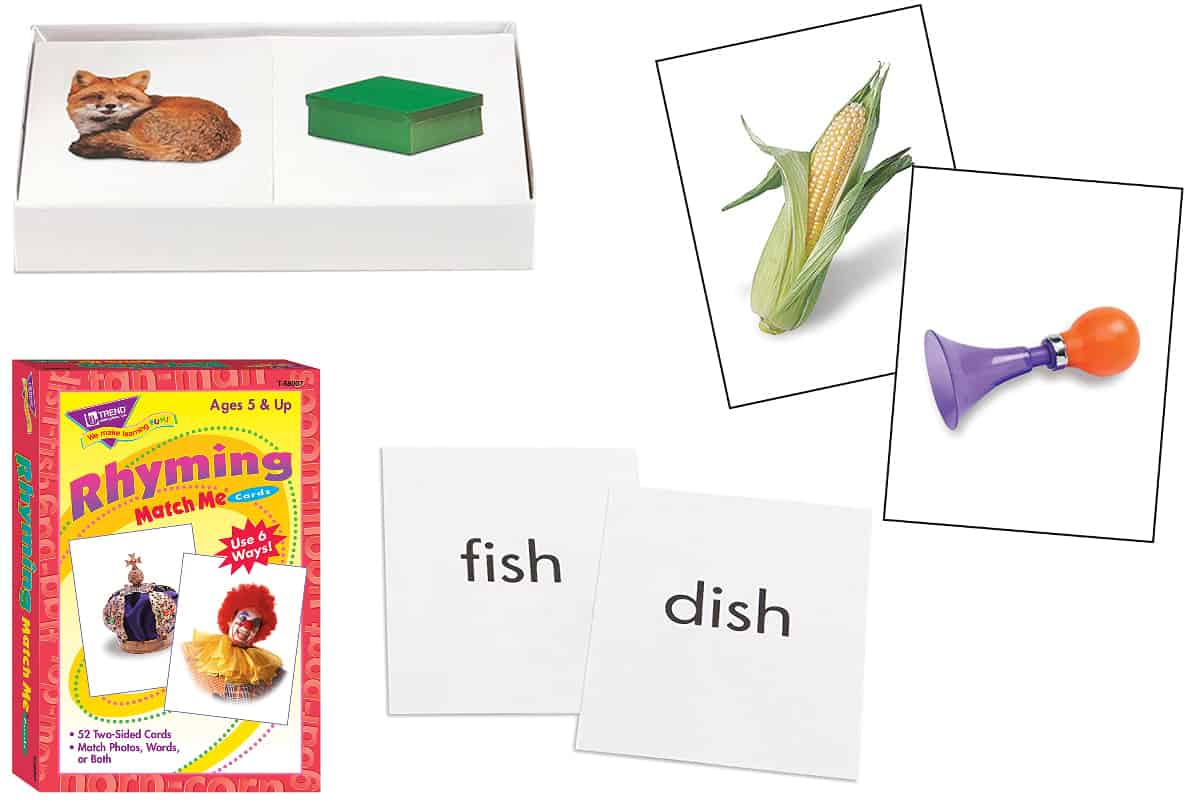
2-5 players | Age 3-7 | For families, teachers, therapists
This game consists of 52 two-sided cards. One side featuring the word while the other illustrates it with a bright picture.
Rhyming Match Me Card is essentially the same game as Rhyming Pocket Flash Cards
is essentially the same game as Rhyming Pocket Flash Cards (with less qualitative card stock). Most cards demonstrate the commonly spelled ending of words but in some cases different endings for the same spelling. I highly recommend Rhyming Match Me Card
(with less qualitative card stock). Most cards demonstrate the commonly spelled ending of words but in some cases different endings for the same spelling. I highly recommend Rhyming Match Me Card for the same reason as Rhyming Pocket Flash Cards
for the same reason as Rhyming Pocket Flash Cards . 6 different rules are included. Note that both games can be used with children as young as 3-year-old (with the pictures).
. 6 different rules are included. Note that both games can be used with children as young as 3-year-old (with the pictures).
Photo Rhymes (Lauri – Play Monster)
★★★☆☆
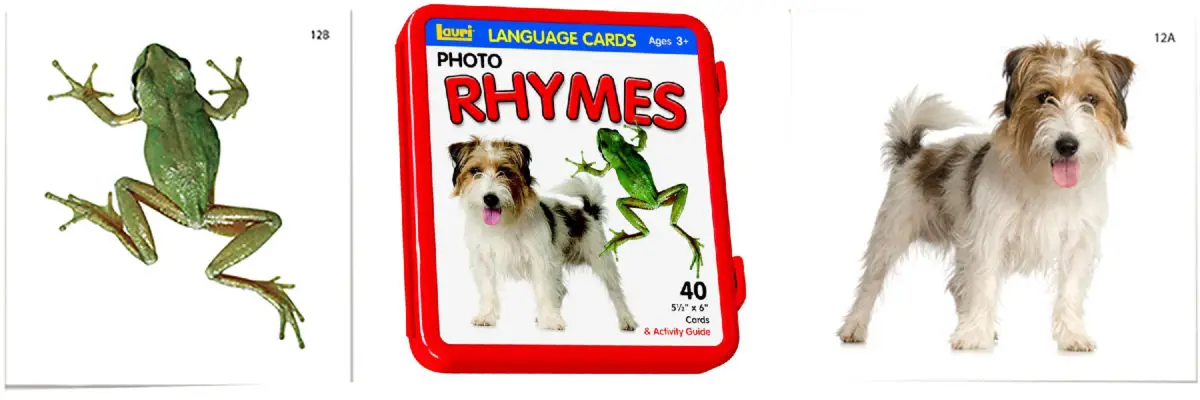
2-4 players | Age 3-5 | For families, teachers
Photo Rhymes is different from the two previous games:
is different from the two previous games:
- Cards have pictures on both sides (they do not have written words) that have matching sounds.
- The same sound is on two cards though, which also makes it possible to play matching game rules
It makes this game less flexible, but is OK with younger children (3 to 5).
The games consists of 40 cards (80 words) and an activity guide. I recommend Photo Rhymes because the cards and the box are of good quality (good pictures as well).
Pop for Word Families Game (Learning Resources)
★★★★★
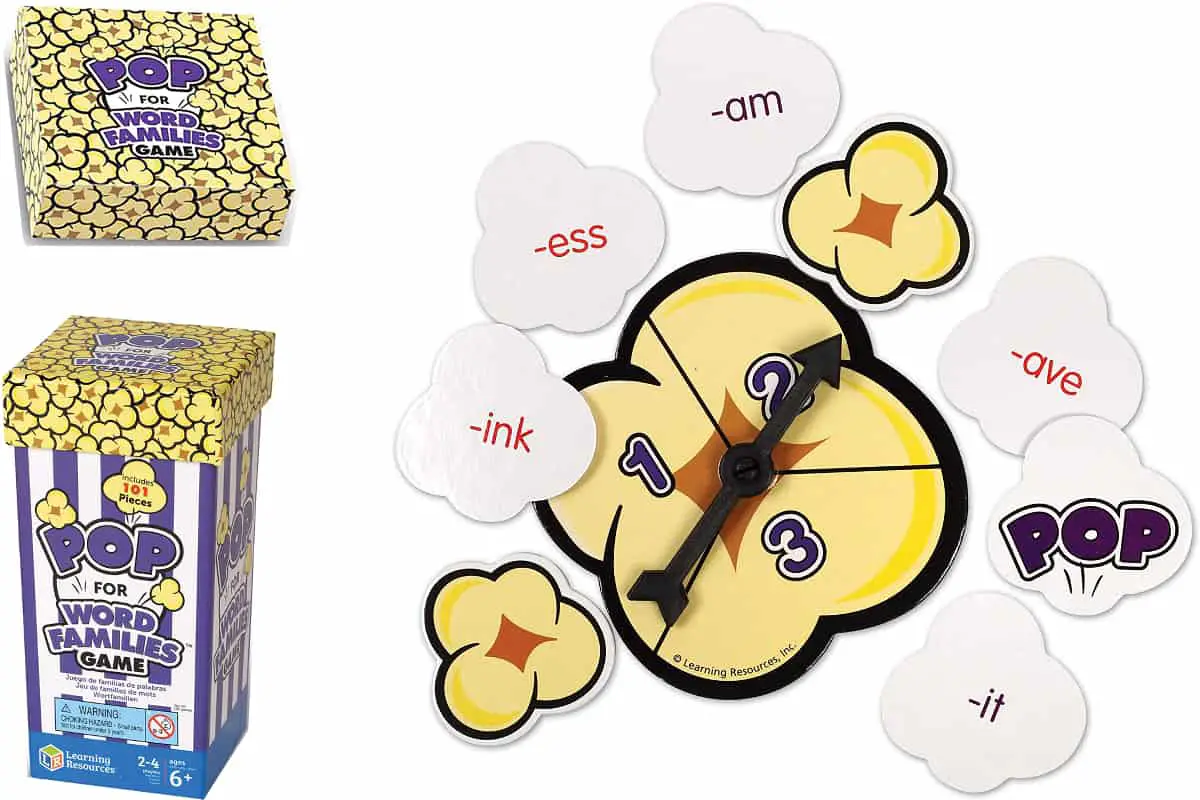
2-4 players | Age 5-10 | For teachers (learning stations), families
I highly recommend Pop for Word which features a completely original principle. The standard play is primarily about word endings rather than rhyming, but you use the rule with rhymes only (and use word endings when kids get older).
which features a completely original principle. The standard play is primarily about word endings rather than rhyming, but you use the rule with rhymes only (and use word endings when kids get older).
The box comes in the shape of a popcorn box, and the kernel shaped cards have a two or three letter ending printed on them (plus 4 “POP” cards – more about that later). This creative design makes it super exciting for kids – and totally original (only “popcorn” game I know).
This game is for kids who already know how to read (or with an adult for 5 year-olds) as they need to correctly pronounce and spell those endings to enjoy the game.
The aim of the game is to keep as many popcorn cards as possible (the player with the most cards in the end wins). Players take turns until the popcorn box is empty (with the popcorn box in the middle of the table). At their turn they:
- Take a popcorn card from the box.
- If they draw a “POP!” card, they put their cards back and remove the “POP” card from the game
- Else spin the wheel to see how many words they have to find.
- If they find the number of words required that rhyme with the popcorn card, they keep the popcorn card.
The 4 “POP” cards are a very good idea as they perfectly suit the theme, and the introduce an element of randomness that makes the game more interesting (the winner is not the player who knows rhymes best but rather the lucky one who did not get a “POP” card last). Therefore the game is not competitive which is perfect.
Picture Rhymes (Carson Dellosa)
★★★★☆
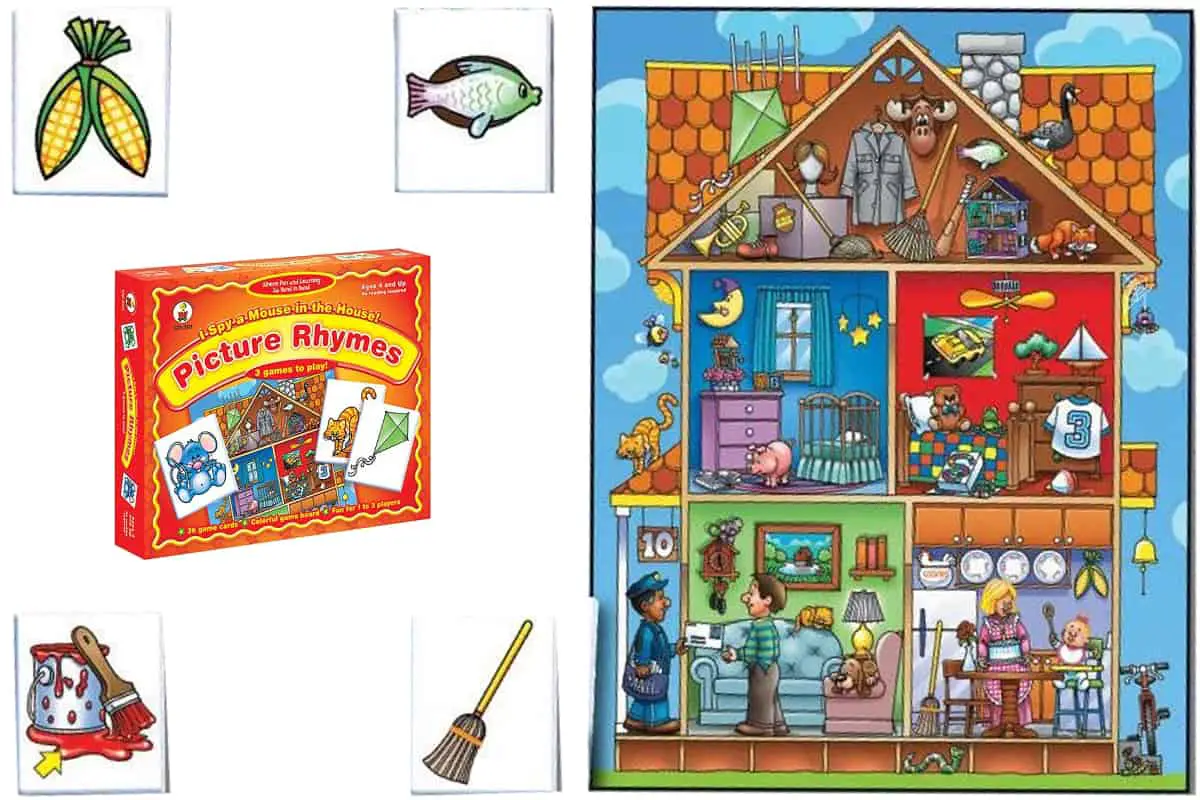
2-4 players | Age 3-5 | For families
Picture Rhyme doesn’t require any reading at all.
It consists of a large board that has a house with its belongings printed on it and 36 cards with a picture printed on it. Players should detect an object in the house (on the board) that rhymes with the name of the object printed on their card. For example, if the card in the player’s hand has a tree then he should point at a “bee” on the board.
When the player gets it right, he gets to keep the card. At the end of the game, the player who has the most cards wins.
I recommend Picture Rhymes because it provides a fun and unique way to practice rhyming without any need for reading.
because it provides a fun and unique way to practice rhyming without any need for reading.
Rhyming Rings (Karen Cox)
★★★☆☆
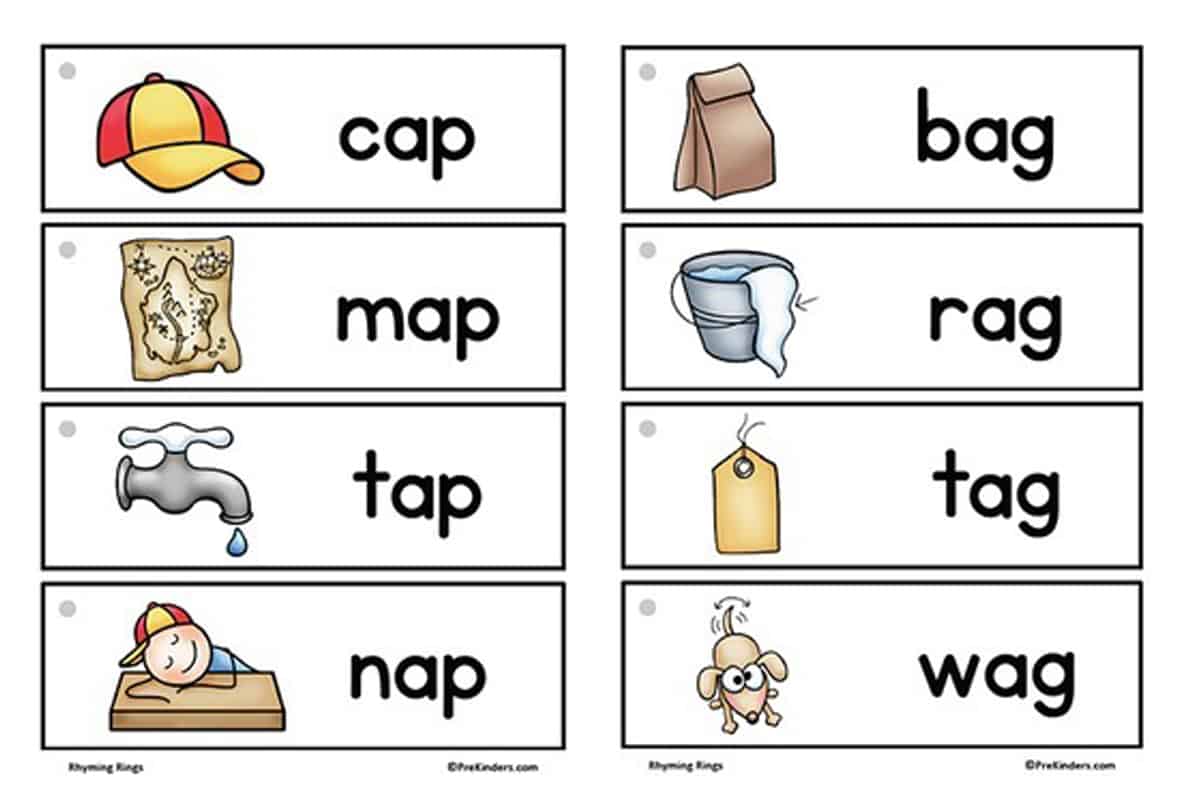
2-4 players | Age 5-7 | For families and teachers
The cards in this printable game (PDF) have the word and the picture together. It consists of 19 sets of rhyming word cards. Each set has 4 cards.
Kids should gather up every four rhyming cards together and bind them with a ring. I recommend rhyming rings because gathering up cards in rings provides an extra fun activity.
because gathering up cards in rings provides an extra fun activity.
Rhyme Puzzles
Rhyming puzzles are easy to use for younger children. They lend to a Montessori type approach and are also great for home use.
Another great aspect is that all the following puzzles are self-corrective. This has many advantages:
- Children can be fully autonomous playing them (great both at home and at school where teachers cannot be with the children all the time).
- It gives the child a self-esteem boost
- Immediate correction of errors is proven to be extremely effective for learning (and is at the core of Montessori methods for example)
Parents can use these puzzles for some bonding time with your child, or as an independent activity through which your child learns to do things on his own.
Match It! – Rhyme – (The Learning Journey)
★★★★★
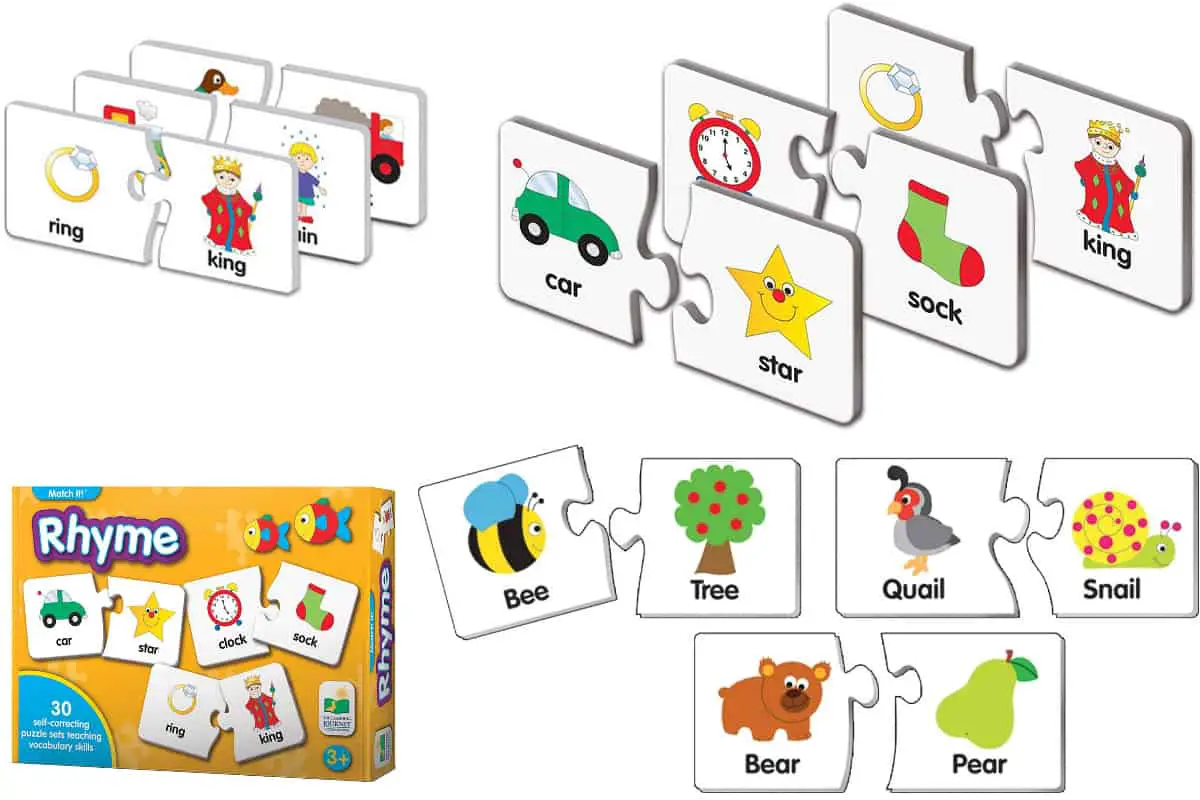
1-2 players | Age 3-7 | For families
I highly recommend Match It! – Rhyme because of its 30 puzzle pairs and the pretty illustrations, with large puzzle pieces that are easy to put together.
Learning Puzzles: Rhyming (Scholastic)
★★★★☆
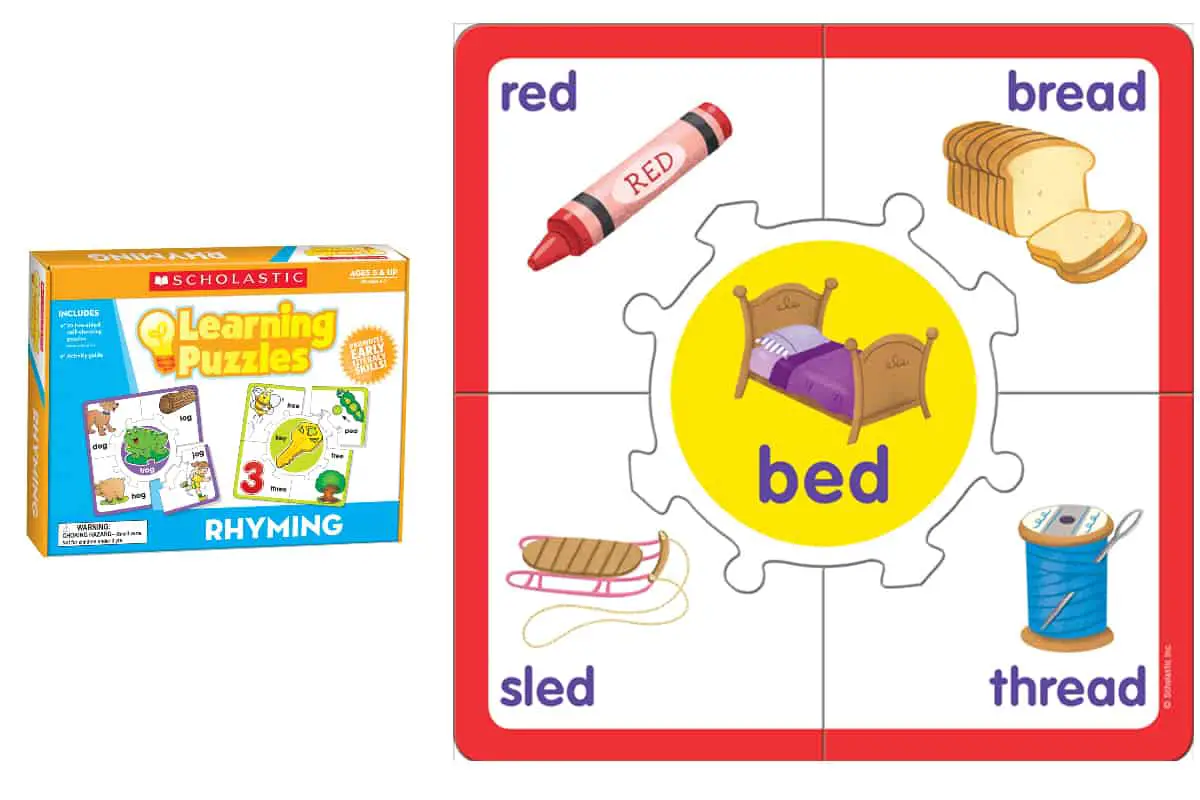
For Parents | 1-2 players | Age 3-7
Learning Puzzles: Rhyming by Scholastic consists of 4 sets of 5 piece puzzles. Each set is self-checking and consists of a central word and 4 other rhyming words.
consists of 4 sets of 5 piece puzzles. Each set is self-checking and consists of a central word and 4 other rhyming words.
Reading Skills Puzzles: Rhyming Words (Didax)
★★★☆☆
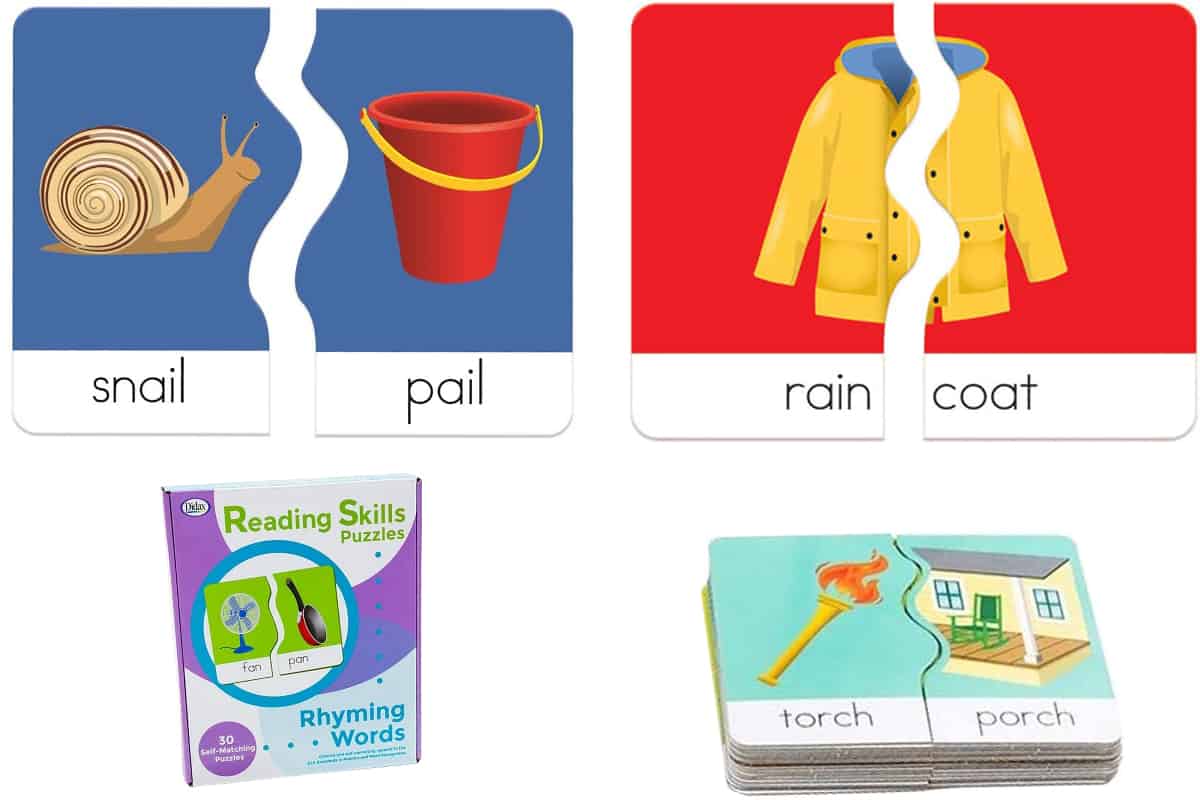
For Parents and teachers | 1-2 players | Age 3-7
Rhyming Words from Didax includes 30 colorful self-correcting puzzles. I like the colorful illustrations.
includes 30 colorful self-correcting puzzles. I like the colorful illustrations.
Rhyming Words (Flash Kids Flash Cards)
★★★★★
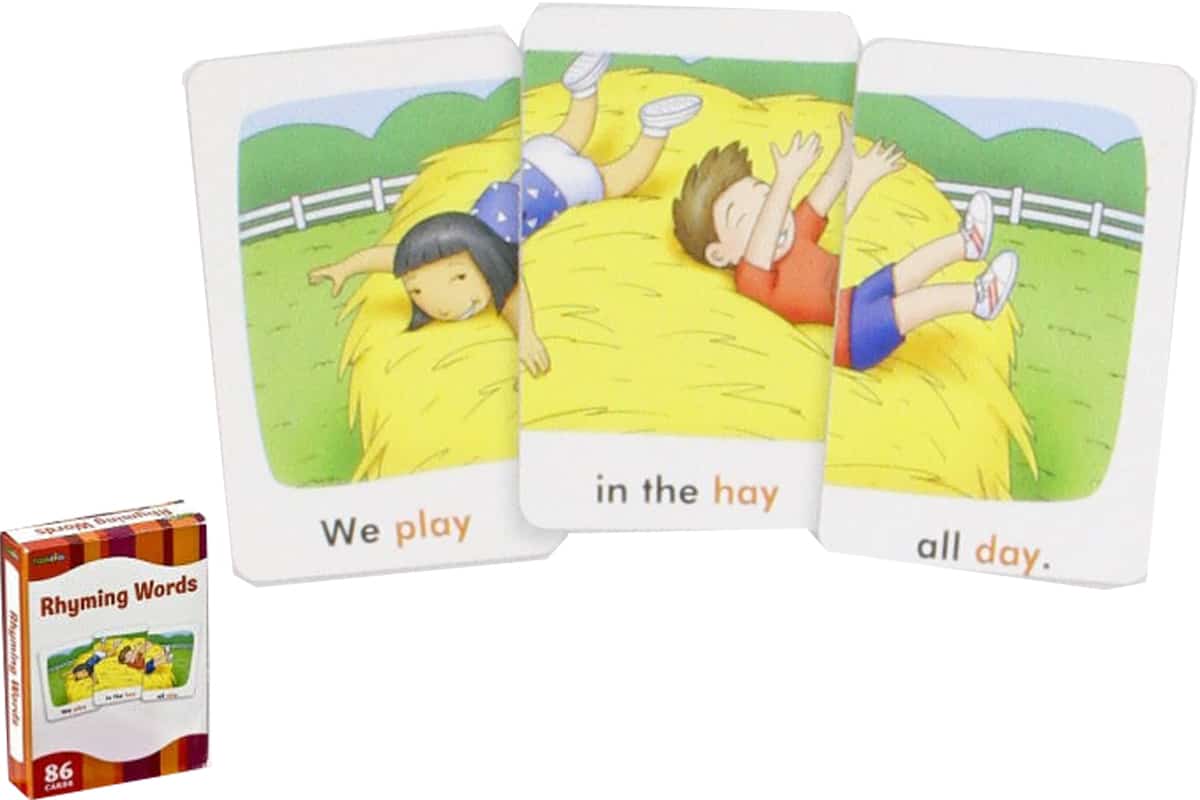
1-2 players | Age 6-7 | For families, teachers, therapists
Rhyming Words is different from its counterparts.
is different from its counterparts.
It consists of 86 cards in total, divided into 28 sets. Each set includes three cards of simple rhyming words. When the 3 cards are matched forming a set, they will make up a funny sentence of rhyming sounds. That way your child is learning rhymes, reading sentences that make sense and laughing their heart out all at once.
I highly recommended Rhyming Words because it also features great illustrations that forms when cards are gathered correctly, making it self-corrective. And the cards make children recognize accurate punctuation as sentences start in capital letters and end in periods.
Rhyming Sounds Match-Ups (Lakeshore) [Discontinued]
★★★☆☆
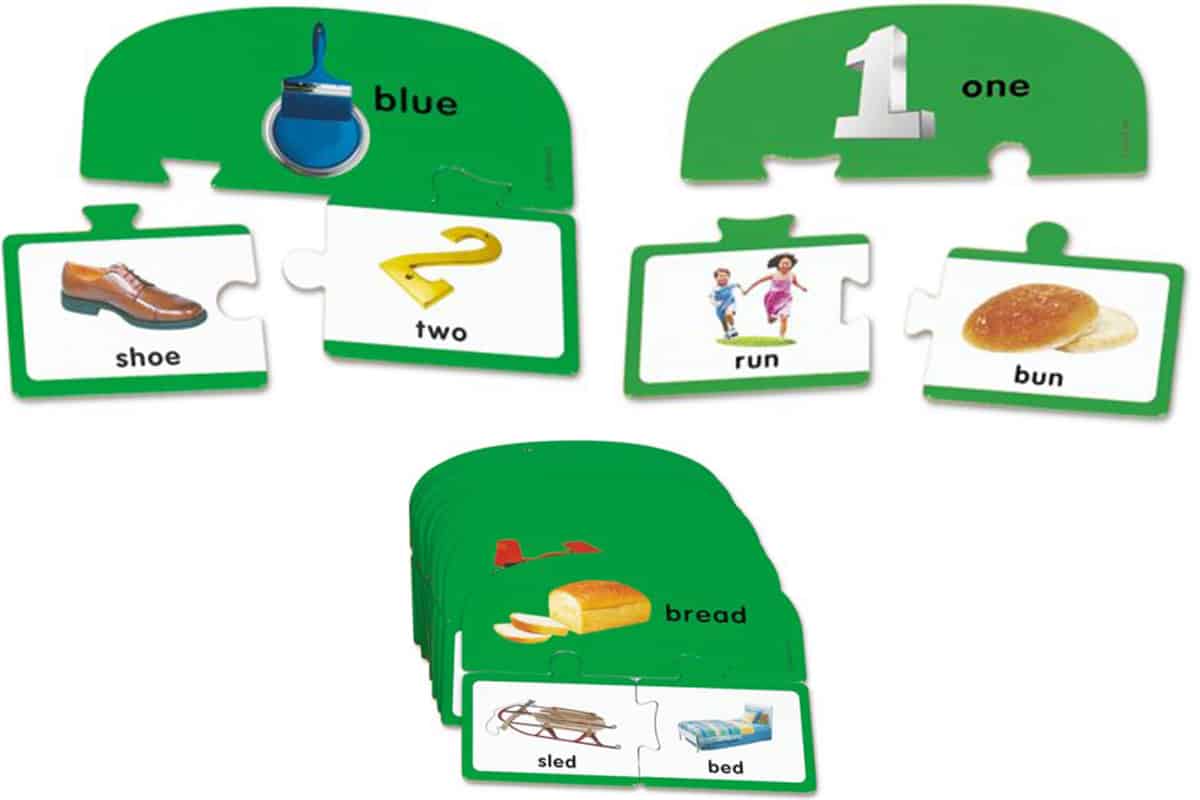
1-2 players | Age: 3-7 | For families
I recommend Rhyming Sounds Match-Ups despite the small number of puzzles (only 12) because puzzles illustrate rhyming words that do not end in same letters, making it clear that words do not have to be spelled the same to rhyme. For instance, the game features rhymes as “two and blue” and “one and bun”.
despite the small number of puzzles (only 12) because puzzles illustrate rhyming words that do not end in same letters, making it clear that words do not have to be spelled the same to rhyme. For instance, the game features rhymes as “two and blue” and “one and bun”.
Rhyming Domino Games
If your child enjoys playing dominoes, you might as well opt for rhyming dominoes rather than puzzles or cards.
Rhyming Words Dominoes (Junior Learning)
★★★★★
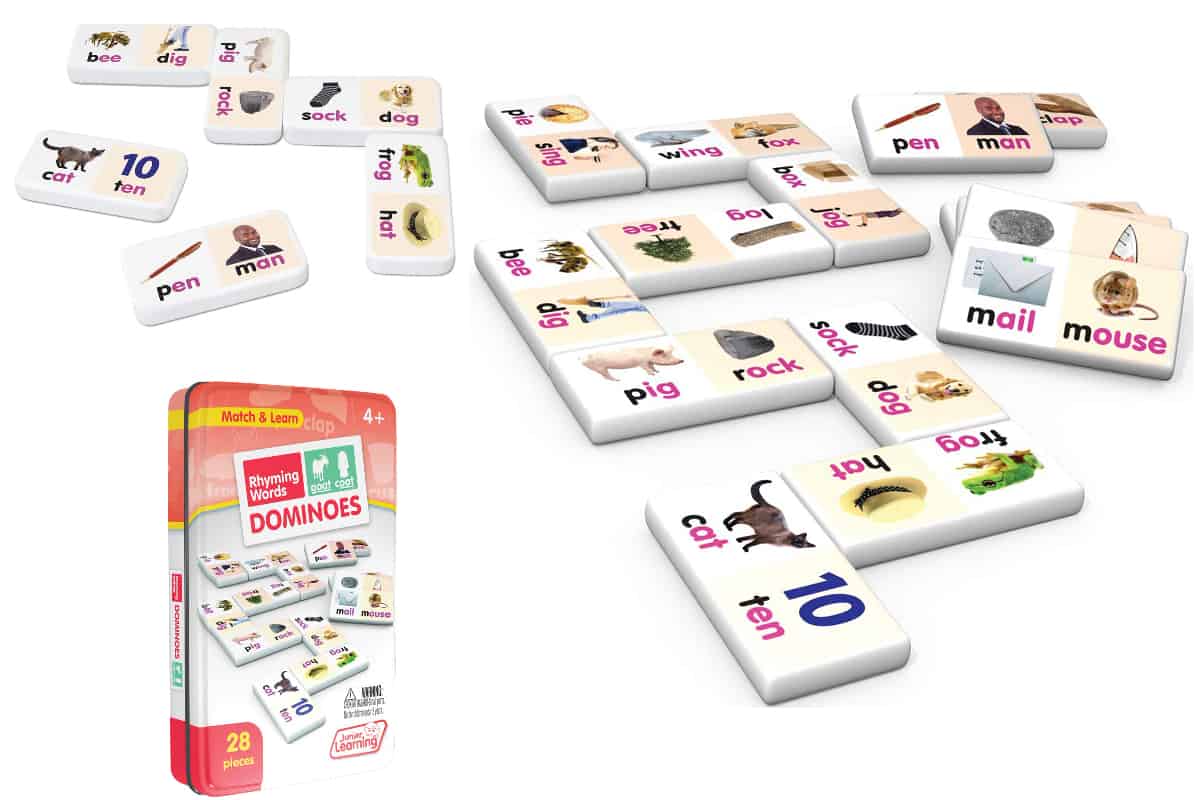
Players: 2-4 players | Age 4-7 | For families, teachers
Rhyming Words Dominoes consists of 28 plastic dominoes. I highly recommend as it as it is really well-designed:
consists of 28 plastic dominoes. I highly recommend as it as it is really well-designed:
- Word ending are colored red to grab players’ attention to match rhyming words.
- Players can recognize the rhyme through pictures, which makes it suitable for young children (with adult supervision as dominoes might be swallowed)
- Plastic dominoes/tin box make the game more durable (perfect for schools)
Rhyme Dominoes (McGraw-Hill)
★★★☆☆
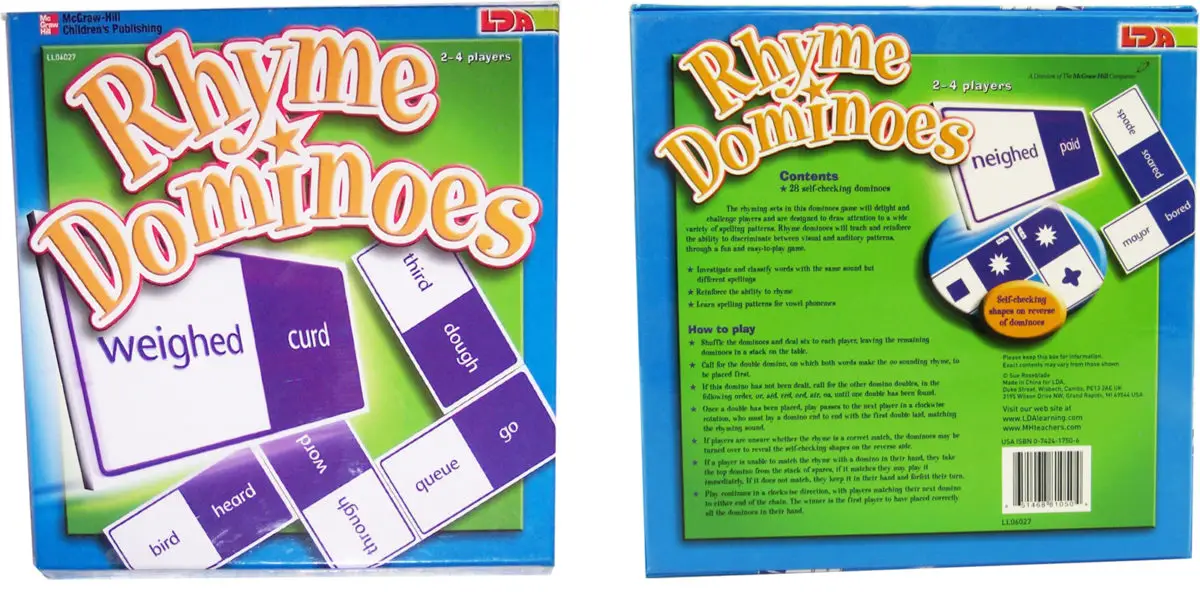
2-4 players| Age 7-8 | For families
Each domino (“punch” cardstock) is divided into 2 colors, white and purple. Players are have to lay dominoes with rhyming words of same color next to each other (which makes the game easier).
I recommend Rhyme Dominoes for 7 to 8-year-old children as rhyming words do not end with the same letters, and there are no illustrations. You might find it a bit expensive for what it is though, especially compared to “Rhyming Words Dominoes”.
for 7 to 8-year-old children as rhyming words do not end with the same letters, and there are no illustrations. You might find it a bit expensive for what it is though, especially compared to “Rhyming Words Dominoes”.
How to Avoid Kids Getting Bored too Soon of Playing Rhyme Games?
Kids get bored of everything too soon. However, I have some tricks for you to avoid this problem. Once you have played the game the regular way and you see that the child might get bored:
- Change the rule and decide that the next time you will be making songs or poems with the rhymes that you can make with the game.
- Or simply switch between different matching game rules for card matching games
- Make it more competitive (the child now knows the rhymes and you can speed up the game) – the challenge becomes making the rhymes before you rather than completing them (for example on puzzles)
- With preschoolers, hide the game just before they get bored. Then introduce it a couple of weeks later, or wait for the child to ask for it (and you might even pretend to be looking for it all over the place until you finally find it – The child will be super happy you found it.)
Are There Other Types of Rhyme Games?
Yes! There are rhyming bingo games and printable games. I plan to make some posts about them, so leave a comment if you are interested!
Edudingo.com is a participant in the Amazon Services LLC Associates Program, an affiliate advertising program designed to provide a means for sites to earn advertising fees by advertising and linking to Amazon.com. We also participate in other affiliate programs which compensate us for referring traffic.
